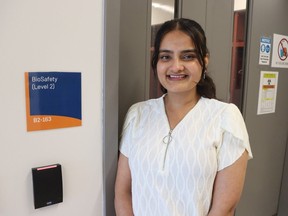Lambton College, long a top performer in applied research among Canadian colleges, has added to its research might.

Lambton College, long a top performer in applied research among Canadian colleges, has added to its research might.
Advertisement 2
Article content
The Sarnia college celebrated the opening of two additional labs during an event Wednesday at its main campus. They are part of a recent $4.3-million four-lab expansion in a chemistry wing at the campus.
Article content
“These openings are monumental developments for our college and our community,” college president Rob Kardas said about the new bio safety LLevel 2 lab and natural health products research lab.
“The bio safety Level 2 lab is one of the few in the entire Ontario college system,” and will allow college researchers to work with “a new tier of agents and microbes in the safest possible manner,” he said.
With that, “comes new opportunities in bio-technology,” Kardas said. “This lab considerably enhances our capacity to explore vaccine development, antibiotics and pharmaceuticals, and all kinds of products that have commercial value.”
Advertisement 3
Article content
Lambton is the only college to have ranked among the Top 5 research colleges in the past seven years and it has attracted more than $20 million in research income in the last five years.
“Bio-technology is a source of economic growth and innovation, and it’s also a way of addressing some of the most pressing challenges facing humanity, including climate change, food security and infectious diseases,” Kardas said.
“This lab increases the likelihood that one day we will be back here celebrating a major health-care breakthrough that took place at Lambton College.”
The natural health products lab will allow the college’s research efforts to move into “new areas in health-centric food products,” Kardas said.
The labs are expected to help the college to attract new applied research partners among companies and industries in the fields and help the Sarnia area to attract bio-technology and health industries, he said.
Advertisement 4
Article content
As well as helping serve college research partners, the new labs will provide more opportunities for its students, said Mehdi Skeikhzadh, Lambton’s senior vice-president of research and innovation.

The bio-industry sector “is going to grow and we need to prepare students and graduates to have the skills for that,” he said.
Current projects using the bio safety lab include production of bio-plastics from locally sourced bacteria strains, Sheikhzadeh said.
Projects in the natural health products lab include production of ginseng supplements, dietary aids and sugar alternatives, he said.
“What makes me most enthusiastic about these labs are the opportunities they create for our students and for our partners,” said Dave Machacek, the college’s interim senior vice-president of academic and student success.
Advertisement 5
Article content
“Last year alone we had nearly 300 students working across all research centers,” he said.
“These research positions provide our students with hands-on experience.”
The two new labs will provide Lambton students with experience not typically available in the college system, Machacek said.
Srijana Sajkota, a second-year bio-technology student at the college, said she already has taken part in research projects in the bio safety lab.
“This experience has been really invaluable,” she said. While the classroom provides the foundation, Sajkota said, “it’s the hands-on experience in the laboratory that truly brings the concept to life.”
The expansion includes two academic labs and the college now has 20 labs in total at both its main campus and nearby at the Western Sarnia-Lambton Research Park, as well as two research pilot plant areas, Sheikhzadeh said.
Article content
